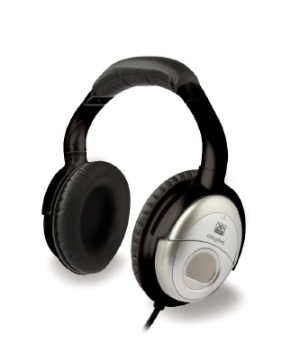Headphones Could Put Heart Devices on the Fritz
by
Brendon Nafziger, DOTmed News Associate Editor | October 07, 2009

Keep these on your head
if you have a pacemaker or
implanted defibrillator
Magnetic interference from portable headphones could cause potentially life-threatening disturbances in implanted cardiac devices.
A study published this month in the journal Heart Rhythm revealed that magnetic fields emitting from headphones could affect pacemakers and implantable cardioverter-defibrillators (ICDs) when placed closer than three centimeters from the chest.
Researchers from the Beth Israel Deaconess Medical Center in Boston took 100 patients with either pacemakers or ICDs, and exposed them to eight different kinds of headphones. Magnetic fields from the ear-pieces interfered with about a third of all devices in the study. Around 38 percent of all ICDs wobbled, making them more sensitive to the interference than pacemakers, of which only 20 percent were affected.
Magnetic interference was strongest if the headphones emitted fields 10 gauss or higher at two centimeters away from the chest, but it would be hard for a consumer to gauge the power of a store-bought headphone.
If you have an implant but don't want to ditch your iPod, don't worry: no interference was seen at all in any of the headphones if they were held a good distance away from the torso. Keeping headphones three centimeters or more away was enough to stop the effect.
And once the headphones were taken away, all devices returned to normal, except one, which was permanently re-jiggered to a different rhythm. (The patient was unharmed.)
The two cardiac devices are receptive to magnets in part because magnet-deactivation can be clinically useful, William Maisel, M.D., the lead author of the study and the director of the Medical Device Safety Institute at Beth Israel, tells DOTmed News. "At times we want to temporarily deactivate an ICD (like when someone is going for surgery). Placing a magnet over their device can do this in a convenient way."
But although no one in the study was seriously affected, unintentional magnet-deactivation can be dangerous. "In pacemakers, the magnetic interference results in 'asynchronous pacing' - which means that the pacemaker delivers signals to the heart without regard to the underlying heart rhythm," Dr. Maisel explains. "Rarely, this could trigger...arrhythmia."
And in defibrillators, a sufficient magnetic interference could prevent the device from noticing heart rhythm irregularities. "If the patient had a life-threatening heart problem while the magnet (or headphone) were over their device, the device would not treat it," Dr. Maisel warns.
Dr. Maisel began investigating the subject after reports published two year ago suggested iPods interfered with pacemakers. These reports were later shown to be false, he says.
